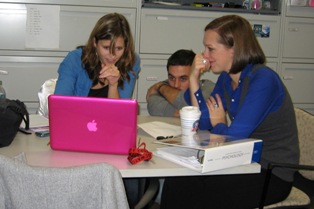
Danielle, Josh and Stefanie in the Lab, Fall 2010
Come visit us! E-mail Dr. Spievak to find out when the next meeting is scheduled.
| Danielle, Josh and Stefanie collaborated on a research project about self-injurious behaviors (SIB). They found a positive correlation between SIB and self-focus, suggesting that SIB may function as an escape from the negative affect resulting from high levels of self-focus. Connections were found between SIB and coping with substances. Trait anxiety and self-focus, when combined with maladaptive coping and/or trauma, may also be associated with self-injurious behaviors. Trauma symptoms and catastrophizing appeared to be key variables in predicting SIB. |
Danielle, Josh and Stefanie in the Lab, Fall 2010 |
|
Bryn in Indianapolis Summer 2009 |
Bryn
found that self esteem was higher in those who reported varsity, club,
etc. sports participation. Those who worried less about body shape
described themselves as more athletic and had an athletic body image.
Women who reported an athletic body image reported their self esteem was
less dependent on others’ approval and less dependent on appearance.
Women with an athletic body image also reported less eating disordered
behavior. |
| Jen did a follow up study (to Lynn's described below) and found that the correlations between attention deficits and sleep disturbances, eating disordered behavior, substance abuse, depression, and anxiety were significant. These findings strongly suggest that adults with attentional difficulties, even at subclinical levels, may be suffering from sleep disturbances and engaging in harmful addictive behaviors. |
|
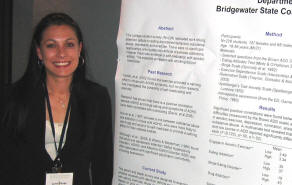 Lynn at APS in Washington DC (2007) |
Lynn's
Study indicated that participants who reported attention deficits also
tended to report addictive behaviors such as overeating, exercising and
smoking. As expected, correlations were found between ADHD and
compulsive exercise, depression, rumination, anxiety, and substance
abuse. These results suggest a need to thoroughly screen for comorbid
anxiety, mood, eating, and substance abuse disorders in individuals with
ADHD.
|
||
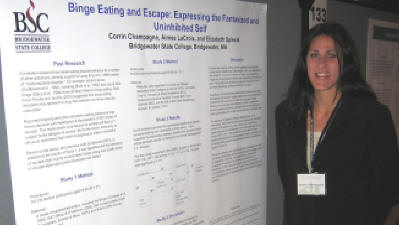 Corrin at APS in Washington DC (2007) |
Corrin's masters thesis focused on binge eating. She found that separate and distinct patterns predicted escape style coping and binge behaviors. Binge eating was also linked to risky behaviors. Escape style coping was linked to chronic self focus and anxiety. | ||
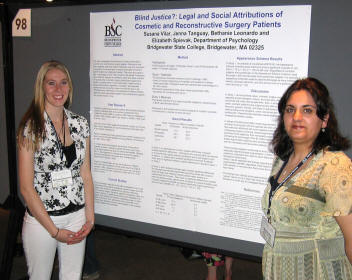 Bethanie and Sue at APS in Washington DC (2007) |
In Bethanie and Sue's study on medical malpractice and corporate negligence litigation, they found that mock jurors gave lower awards to plaintiffs who had breast augmentation, even if the surgery was reconstructive after mastectomy. Plaintiffs who sued after rhinoplasty received higher awards, particularly after a car accident in which their nose was broken. Plaintiffs who were injured due to corporate negligence received the highest awards. | ||
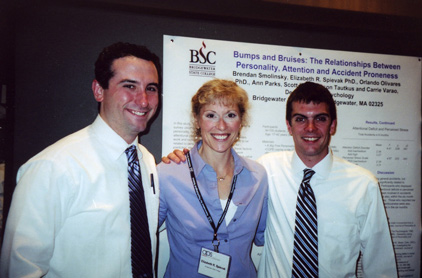 Brendan, Elizabeth and Scott at APS in NYC (2006) |
In Brendan and Scott's study, participants completed a survey to measure personality, cognitive style, stress, anxiety, and attentional processes. Self reports of risky behaviors and accident rates were expected to be related to personality and attitudinal factors. Participants who displayed higher than average levels of attentional deficits or perceived stress were more likely to have been involved in accidents within not only the prior month, but also, within the six month period before completing this survey. Those who reported low levels of agreeableness and conscientiousness were also more commonly involved in accidents in the six months previous to their participation. | ||
 Danielle at the APS in NYC (2006) |
Danielle's study explored the relationship between specific health behaviors and personal characteristics. Participants completed a survey concerning social exercise habits, amount of exercise, risk of eating disorders, body image, self-focus, self-consciousness, and temporal orientation. Significant relationships were found between temporal orientation and exercise habits, body image, and risk of eating disorders. Significant relationships were also found between frequency of exercise and exercise dependence. Danielle is shown here discussing implications for future research with a professor from Texas. |
 |
Christine did her honor's thesis on meditation. She found that experienced meditators and students who had been meditating for a short time were different in interesting ways. She looked at survey results from two samples and compared the groups on temporal orientation, personality, anxiety and stress and addiction/coping style. |
 Jenna and Elizabeth at APS in NYC |
Ann (below with Amy) and Jenna’s (at left ) research examined how jurors might find for a sexual abuse case against women. Attributions of responsibility and guilt for sex crimes were measured. It was hypothesized that it would take participants longer to respond to questions about females as sex offenders, that females would be held less responsible for their actions and that women would be assigned more responsibility for lesser charges. The reaction time results were a bit complicated, but women were attributed more guilt for lesser charges (for example molestation as compared to rape). When the participants attributed higher levels of guilt to an offender, response times were longer, indicating that participants considered their judgments carefully, particularly when assigning more guilt. |
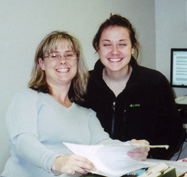 Ann and Amy in the Lab |
Ann was our lab supervisor in the '05-'06 school year and Amy will be the lab supervisor this year.
They schedule the studies, interact with other students and professors and generally make sure things
run smoothly.
All this and they take classes and do research too! We could not do it without them. |
 Bethanie in the Lab |
Bethanie is doing her honor's thesis on judgments of plaintiffs in civil liability cases. She is following up on findings from Jenna's study in which participants who were suing after cosmetic surgery were judged harshly and were awarded less damages. Bethanie expects to find that, when compared to other civil litigation and medical malpractice cases, jurors will be more interested in "irrelevant" information about the plaintiffs personal lives when judging a case about elective surgery. She also expects to find that awarded damages will be influenced by the type of elective surgery and the circumstances surrounding the plaintiffs decision to have surgery (restorative vs. cosmetic). |
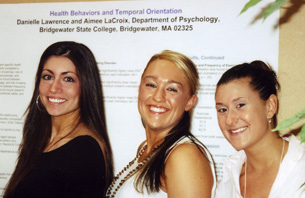 Kristen, Aimee and Danielle at the BSC Symposium |
Kristen (far left) is doing her honor's thesis on bullying lawsuits, particularly on the communication factors that may predict litigation. She is doing an archival study on cases in which there was a monetary award or settlement. She is also collecting data from the parents of bullied children in a web survey. Kristen expects to find that, in cases that have gone to trial, or in which parents are considering legal action, the communication and action taken by school officials is unsatisfactory to parents. Parents may report feeling that the school system is uncaring or unresponsive to requests for help and/or insensitive to the seriousness of their child's situation. |
|
Aimee (above middle) is working on a binge eating study in which she is attempting to distinguish between eating disorders and addictive eating behaviors. She is following up and extending Danielle's research in which individual differences predicted particular eating habits. She is using survey responses to understand the relationships between addictive and risky behaviors and binge eating. |
|
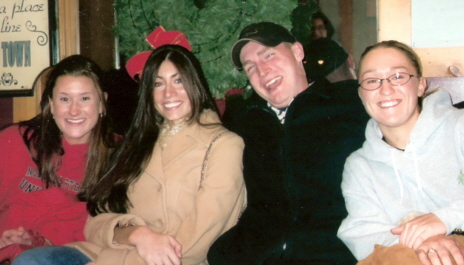 |
We have fun working, but we play, too! |
 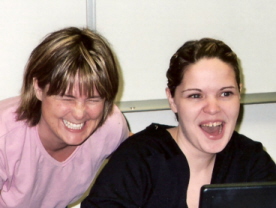 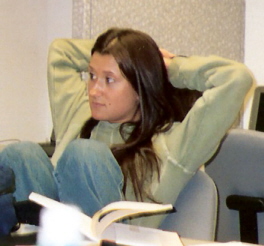 |
More pictures to come . . . |